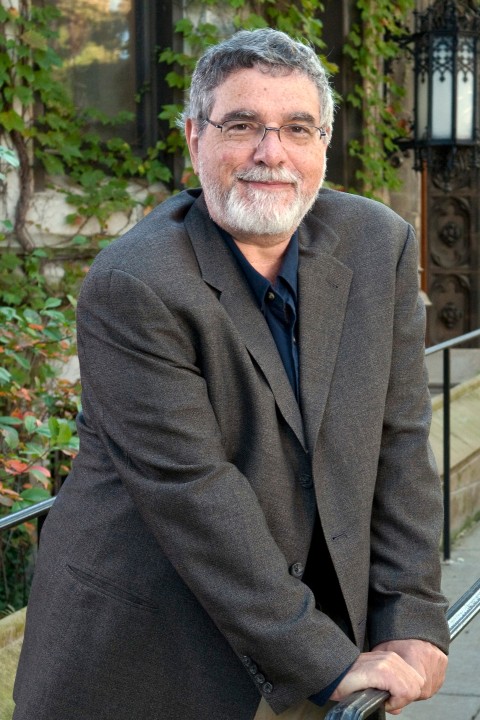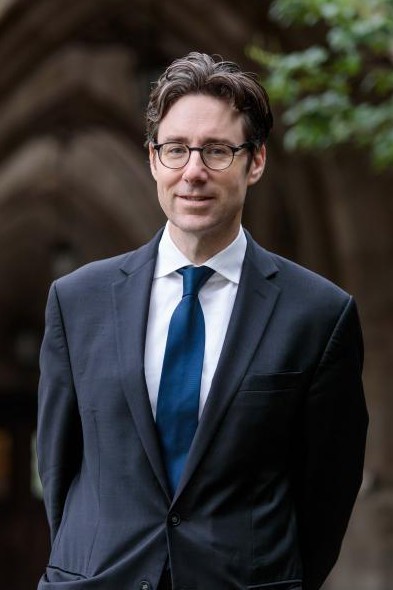As classes in the College begin for the 2021-22 school year, they will do so under the leadership of two new Collegiate Masters.
Howard Nusbaum, the Stella M. Rowley Professor of Psychology has assumed the role of Master of the Social Sciences Collegiate Division, while Eric Slauter, an associate professor of English and director of the Karla Scherer Center for the Study of American Culture will assume the same role in Humanities starting in January.
The collegiate divisions support the College’s unique identity as a liberal arts college situated in a research university, where an empowering general education is connected with the specialized knowledge of the departments. The collegiate divisions were created to correspond to the graduate divisions of the Arts and Sciences, supporting this integration in broad areas of study, from the respective Core and Civ sequences to a wealth of majors, minors and co-curricular programs.
Collegiate Masters have broad oversight for the curriculum and academic operations of their respective areas. By sponsoring curricular innovation and excellence, they have the opportunity to shape the undergraduate programs in the Humanities and the Social Sciences, as well as the Biological and Physical Sciences. They can also align the field advancing work of the divisions with the enrichment of corresponding programs in the College.
“The Master plays an important role in the University of Chicago undergraduate experience, both with respect to our Core Curriculum and for the broader program of each Division,” said John W. Boyer, Dean of the College. “Howard and Eric are well suited to step into their new roles and uphold the high standard for rigor in the College curriculum.”
Below, learn more about the professional and academic backgrounds of each new Collegiate Master, and what they enjoy most about teaching at the University of Chicago.
Howard Nusbaum, Master of the Social Sciences Collegiate Division

Howard Nusbaum’s research experiences in psychology began in the University of Chicago Laboratory School. As a student there, he carried out his first amateur studies, learned hypnosis to study sensory memory, built his own automatic Skinner box to study learning in rats, and built a language-processing computer program.
His undergraduate majors were in computer science and psychology, and he did research on working memory and artificial intelligence that led to graduate study in perception at SUNY/Buffalo and a postdoctoral NIH position in speech perception at Indiana University.
“I’ve always been interested in what it means to be a person. How we change as people with experience and through our interactions with others have been enduring scientific challenges,” he said. “Everyone has beliefs about these challenges, and science can reveal more than we can intuit.”
His research has ranged from studying the cognitive and social neuroscience of speech communication and music perception, the role of attention and sleep in forming and sustaining learning and memory, and neuroeconomics.
Since taking a faculty position at UChicago in 1986, he has compiled several awards, including the coveted Quantrell Award, which signifies excellence in teaching undergraduate students, in 2012.
He currently teaches the following courses: Neuroscience of Communication, Understanding Practical Wisdom, Controversies in Cognitive Psychology, Attention, Introduction to Learning and Memory and the Core Course Mind.
In the first class Nusbaum taught at the University, he walked in with pages of notes for a lecture on models of the mind. 10 minutes into the class, he had forgotten about the notes and was deep in a discussion that ranged from philosophy to biology to psychology, “all in service of understanding the science of mind.”
“UChicago students are constantly questioning conclusions and reasoning and suggesting new questions and studies,” he said. “My favorite part about teaching here is that which sets us apart—the way students at the University of Chicago read and think and challenge.”
Throughout his career, Nusbaum has collaborated with colleagues in neuroethology, psychology, medicine, anthropology and philosophy, which he said has shaped the development of his interests in mind, brain, and behavior. Being named a Collegiate Master, he said, is an opportunity to bring a multidisciplinary approach to the Social Sciences Collegiate Division.
“As an institution, we have always placed an emphasis on the importance of analytic thinking and the development of new knowledge, and to help sustain and develop this in the Social Sciences and in collaboration with the other divisions and our professional schools is an honor,” he said. “I am looking forward to the new educational opportunities for scholarship and science that this role represents.”
As Master, Nusbaum will succeed James Sparrow, Associate Professor of History, who has guided an impressive range of initiatives over two terms in office that have greatly strengthened the undergraduate curriculum of the social sciences. Students who enroll in the collegiate division’s Core sequences have benefited from discussions with invited scholars at the College Roundtable and the expanded availability of writing support. Sparrow has played a leading role in the development of the Democracy Curriculum in the College and the integration of undergraduate research programs and opportunities in the social sciences, particularly through the Merriam Scholars program, which he initiated. In his second term, he helped develop or revive a set of now growing interdisciplinary majors, including Law, Letters and Society and Global Studies.
Eric Slauter, Master of the Humanities Collegiate Division

Eric Slauter, who specializes in early American history and culture, developed his interests through his high school and undergraduate studies. His teachers along the way took time to help him learn how to write and ask new questions of old documents, skills he then brought to his first student research assistant position.
Having taught at UChicago since 2000, he said it is a great joy to be able to work with undergraduate research assistants and to encourage their own explorations of the past.
Within his academic specialization, Slauter is particularly focused on the literature of politics, intellectual history, and the history of books and reading. He has taught in the “Media Aesthetics'' Humanities Core and more recently in the “America in World Civilization” sequence, as well as period courses from the American Revolution to the Civil War and methods courses on book history and the multidisciplinary study of American culture.
For the past few years, he has taught an HCD Signature course on the Declaration of Independence that draws on some of the manuscript and print holdings of the library’s Hanna Holborn Gray Special Collections Research Center.
“It is such a pleasure to work with librarians to help College students handle primary sources, and to encourage undergraduates to use their imaginations and growing expertise to reconstruct the past,” he said. “I’ve been astonished, in turn, by what students themselves discover in the collections.”
In his two decades at the College, he has held a variety of administrative positions: he has directed the Karla Scherer Center for the Study of American Culture, chaired the faculty board for the University of Chicago Press, and served as visiting editor for the William and Mary Quarterly, the top journal in early American history. For the past three years Slauter has focused attention on graduate education as a deputy dean in the Humanities Division.
With his deep background in administration and creative engagement in undergraduate teaching, Slauter will have the collaborative experience and the opportunity to sponsor new touchpoints between the humanities faculty and the needs of the College.
Slauter said he considers the Master of Humanities position to be a special opportunity in American higher education, since UChicago is one of the only schools with a dedicated Division of the Humanities. “UChicago undergraduates are fortunate to be able to select from a wide range of Humanities Core sequences, to be able to learn a variety of languages, and to follow their interests and explore new directions under the quarter system in ways that are not possible at other colleges,” he said, noting that alumni consistently single out courses in the Humanities as highlights of their experiences at UChicago.
He is also “thrilled, honored and humbled” to work alongside Deans John Boyer and Anne Robertson and to succeed Christopher Wild, a professor in the department of Germanic Studies, in the role. “Christopher Wild is one of the most innovative academic leaders I know,” Slauter added, “and I am eager to be able to build on the programs and opportunities he’s created.”
During Wild’s six-year tenure the offerings of the Humanities have increased in exciting ways, with the launch of highly popular Signature Courses, the Parrhesia Program for Public Discourse, and new majors like Media Arts and Design, and Creative Writing. Wild has also been a strong advocate for undergraduate research opportunities in the humanities, such as the College Summer Institute, founded in 2018, and internships for majors and minors in the Humanities and the Arts.